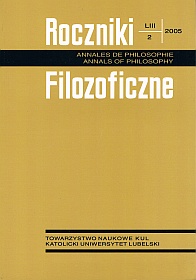Some Weaknesses in the Traditional Conception of Rationality
(transl. by Agnieszka Lekka-Kowalik)
Abstract
The paper aims to show that the model of rationality dominating in our culture is based on a series of misunderstandings. According to the author this model consists of the following claims: (1) all our actions are caused by beliefs and desires; (2) rationality is a matter of following rules; (3) rationality is a separate cognitive faculty or capacity; (4) the weakness of the will can arise only in cases where there is something wrong with the psychological antecedent of the action; (5) practical reason has to start with the primary desires that are beyond the scope of rationality; (6) rationality cannot be exercised if desires are inconsistent. The author discusses each of these claims, arguing that they are not tenable if we are to stay adequate to real cases of rational action. In particular the author develops an idea according to which rationality and freedom are coextensive, human beings are capable of commitment what creates desire-independent reasons for action, and desires can be inconsistent, for they constitute a kind of mental states different from beliefs: they represent not as the world is, but how we would like it to be.
Copyright (c) 2005 Roczniki Filozoficzne

This work is licensed under a Creative Commons Attribution-NonCommercial-NoDerivatives 4.0 International License.





